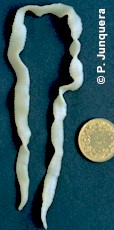Cysticercus ovis or sheep measles
20 September 2016C.Ovis is the larval stage of a tapeworm that affects animals such as dogs, foxes, etc. This does not transfer to humans. The adult tapeworm called Taenia ovis lives in the intestine of the dog/fox and eggs are shed in the faeces. The next stage of the lifecycle involves sheep, who ingest these tapeworm eggs from contaminated pastures. The eggs hatch within the sheep’s intestine, larvae are carried in the bloodstream of the animal, which target tissues and active muscles e.g. heart, lungs, etc. This results in cysts developing in the muscles, which can become hard over time. The life cycle completes when dogs/foxes eat raw meat and/or offal which contain cysts.
Sheep do not suffer for having C.Ovis cysts and it is not visible to the flock manager until the sheep are processed and the carcass and offal are inspected. Depending on the level of infection, the presence of cysts can result in either the offal being rejected or the entire carcass being condemned. C.Ovis generally has a low background level in the UK, with occasional unpredictable spikes. When a spike occurs, condemnation of carcasses can have huge financial implications, Management that reduces the risk of a large ‘spike’ of cases occurring include:
- Regular worming of farm dogs at six week intervals (wormer containing praziquantel target tapeworm).
- Remove dead stock promptly so dogs and foxes don’t get a chance to scavenge.
- Store dead stock in a dog proof container to prevent scavenging when dogs are loose.
- Don’t feed dogs raw meat.
- Keep dogs away from silage pits, feed stores and sheep housing.
- Pick up dog faeces and dispose.
- Feed sheep in troughs rather than on the ground.
- Fence off footpaths used by dog walkers and put up signage on gates and footpaths asking for all faeces to be collected and provide bins for disposal.
Kirsten Williams, kirsten.williams@sac.co.uk.
Sign up to the FAS newsletter
Receive updates on news, events and publications from Scotland’s Farm Advisory Service

